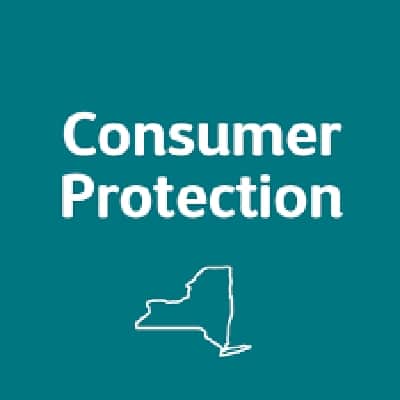The New York State Division of Consumer Protection (DCP) is alerting consumers to a rise in online shopping complaints as the COVID-19 pandemic continues. According to Federal Trade Commission (FTC) data, online shopping complaint trends continue their upward trajectory. The FTC reports that during April and May 2020, more people reported issues with online shopping than any other months on record, with more than half never receiving the products they ordered. Of the 84,000 Online Shopping and Negative Review complaints reported to the FTC in the second quarter of 2020, New Yorkers reported over 4,400 complaints and 75% resulted in monetary loss.
“As New York State continues it data-driven, phased in approach to reopening, many of us continue to stay at home as much as possible. Finding the items we need such as masks, gloves, or hand sanitizers may be difficult at our local stores, making online shopping more appealing,” said Secretary of State Rossana Rosado, who oversees the New York State Division of Consumer Protection. “Online shopping offers convenience and keeps us safe at home during these trying times, but we must be careful to whom we give our hard-earned money, especially online.”
Below are tips for New Yorkers to help keep protect your online purchases:
Know Your Rights:
- The Federal Mail, Internet, or Telephone Order Merchandise Rule (the Mail Order Rule) of 1975, updated in 2014 to include online orders, applies to merchandise sold to consumers online, by mail or by phone. It states that your order must be delivered within 30 days unless otherwise stated. If there is a delay, you must be notified. If the company cannot reach you to obtain your consent to the delay, they must, without being asked, promptly refund all the money you paid for the unshipped merchandise.
Savvy Online Shopping Tips:
- Shop on trusted sites with retailers known to you. In the era of social media marketing and influencers, consumers are more exposed to sham businesses that advertise a premier product but only deliver a low quality version of the advertised item, if they deliver anything at all. Use caution on trusted sites that host items for third party sellers.
- Beware of third party vendors If redirected from a trusted site to a third party site, read the sellers policies, review ratings, read consumer comments and most importantly do a broad internet search before making your purchase. Trusted retailers who host third party sellers do not warranty their sales, thus you could get a substandard product or no product at all when you take the risk and purchase from an unknown third party vendor.
- Do your research if you want to try a new site or retailer. Performing a broad internet search will provide you with important feedback from other customers. Are there any reviews? How is the company responding to its customers? Read the comments within any social media advertisements. This will help you assess what to expect if something goes wrong.
- Read the product specifications. Online marketing is geared to get you to buy so it is important to understand the product you are purchasing and the terms of the sale to ensure you are getting what you want.
- Comparison shop. Search other websites to compare price, quality, return policies, delivery cost and speed. Buying the “cheapest” advertised price may cost you more when you factor in delivery charges in the short term or return policies in the long term.
- Protect your privacy. Our devices are generally defaulted to share the maximum amount of data as possible. Take precautions and make changes to your settings to limit the personal data you share.
- File a complaint. If you are not satisfied with your online shopping experience, you should file a complaint online anytime at dos.ny.gov/consumerprotection, or call the Consumer Helpline at 800-697-1220, Monday through Friday, 8:30am-4:30pm to request a complaint form.
Tips for Using Credit Cards Online:
- Check the website’s encryption, it’s easier than you think. Before entering your credit card information, make sure that the website’s address begins with “https” and that there is a closed lock or unbroken key symbol in the lower portion of your window or up on the website address bar.
- Don’t keep the credit card on file for future purchases. Provide your credit card number each time you make a purchase.
- Designate one credit card and one email address for online shopping. This will allow for easy review of purchases and provide protection in case of a dispute.














